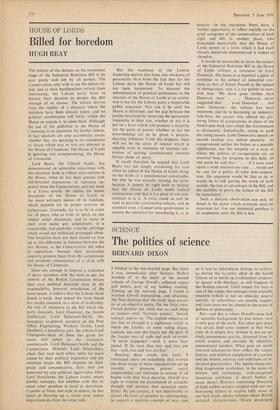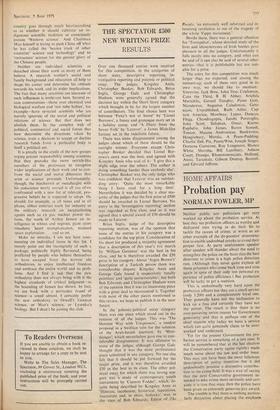SCIENCE
The politics of science
BERNARD DIXON
I blinked at the sun-dazzled page. But there it was, immediately after 'Science; Wells's worship of in the index of the second volume of George Orwell's collected essays and letters, part of my holiday reading. Turning up the relevant page, I found a wartime Orwell expounding, and attacking, the Nazi doctrine that 'the truth' does not ex- ist as an .objective entity. On the Nazi view, Orwell pointed out, there was no such thing as science—only 'German science', 'Jewish science', and so on. The implied objective of this line of thought is a nightmare world in which the Leader, or some ruling clique, controls not only the future but the past. If the Leader says of such and such an event, "It never happened"—well, it never hap- pened. If he says that two and two, are five—well, two and two are five.'
Reading these words last week, I ruminated anew on something that worries me about many of those organisations set up recently to promote greater social responsibility and relevance in science. It all begins with that Nazi doctrine. Orwell was right to criticise the prostitution of scientific thought and practice that occurred under Hitler. By any criteria, it was indefensible to distort the facts of genetics or anthropology to support a spurious concept of race—just as it was to subordinate biology to politics. as during the Lysenko affair in the Soviet Union; or to botch up evolutionary evidence to square with theology, as still happens in the Roman church. Total respect for facts is one of the values that emerges from scientific research (which is not an ethically neutral activity, as schoolboys are usually taught). and facts must not be abused in the name of politics or philosophy.
But—and this is where Orwell's own lack of scientific background let him down--that is only part of the truth. The other part does. I'm afraid, lend some support to that Nazi view. It is simply this. Science is not an en- tirely autonomous activity, divorced from its social context and pursued by objective. unemotional zombies. What goes on inside research laboratories does reflect the values. history, and political complexion of a society and the beliefs, motives and ambitions of in- dividual practitioners. The Apollo moon lan- ding programme symbolises, in the realm of science and technology, well-recognised American attributes. (1 shan't bother to name them.) Britain's continuing flowering of high calibre science, coupled with our em- barrassing failure to exploit fully some of our best work, speaks volumes about British national characteristics. Every developing
country goes through much heartsearching as to whether it should cultivate an in- digenous scientific tradition or consciously imitate 'Western science'. And Chairman Mao himself is trying to push China off what he has called the 'beaten track of other countries' science and technology' and to 'restructure' science for the greater glory of the Chinese people.
Neither are individual scientists as detached about their work as many of them believe. A research worker's social and family background and education all help to shape his career and determine his attitude towards his work and its wider implications. The fact that many scientists are unaware of such influences is irrelevant here. Several re- cent controversies—those over chemical and biological warfare and 'test tube babies', for example----have revealed scientists who are naively ignorant of the social and political relations of science. But that does not abolish them. In the complex web of political, commercial and social forces that now determine the directions taken by science, even a decision to accept or decline research funds from a particular body is itself a political act.
It is greatly to the credit of the new groups urging greater responsibility among scientists that they provoke the more ostrich-like members of the profession to recognise wider implications of their work and to con- front the social and moral dilemmas that arise as science proceeds. Unfortunately. though, the biochemist or metallurgist with his conscience newly roused is all too often confronted with a new list of relevant, pro- gressive beliefs he is expected to adopt. He should, for example, at all times and in all places, abhor contract work for industry or the military, research on incapacitating agents such as cs gas, nuclear power sta- tions, the work. of Arthur Jensen on in- telligence in whites and negroes, giant atom smashers, heart transplantation, manned space exploration . .. and so on.
Make no mistake. I am not here com- menting on individual items in this list. I merely point out the incongruity of such a package, politically highly flavoured, being proffered by people who believe themselves to have escaped from the narrow old orthodoxies, to. enjoy intellectual freedom and embrace the entire world and its prob- lems. And l find it sad that the new orthodoxy does not always bring with it the highest standards of critical judgment—as the hounding of Jensen has shown. In fact. we are back with a particular brand of science—a creed almost. I certainly prefer the new orthodoxy to Orwell's German science, or Mao's science, or Lysenko's biology. But I shan't be joining the club.



































 Previous page
Previous page